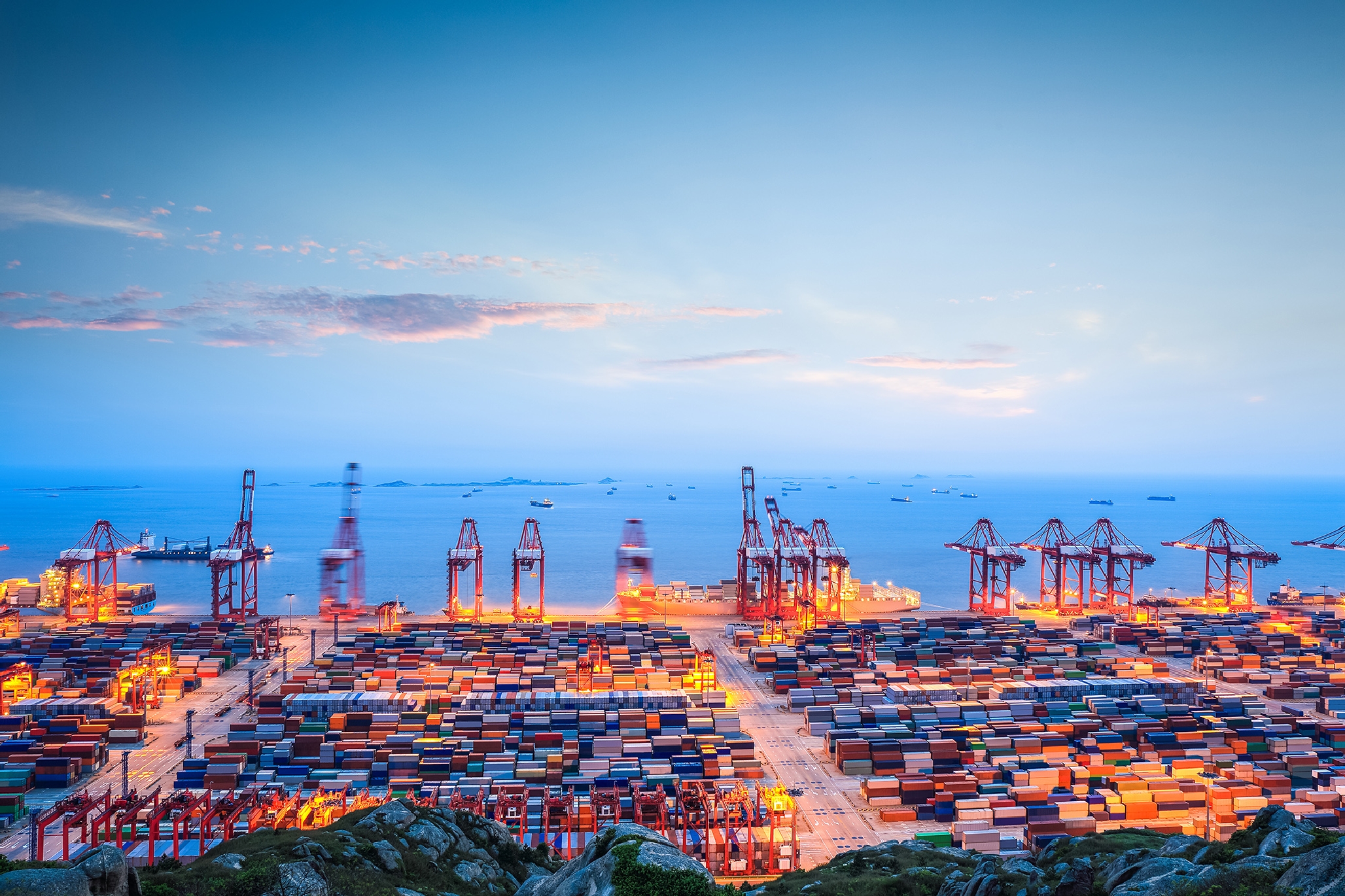Spring 2020
Panopticons and Chokepoints
– Richard Byrne
A new view of international relations puts global networks – and how they can be weaponized – at its center. What’s the future of regulation in this new landscape?
Students of international relations tend to focus on nations as separate entities with sovereignty, borders, economies. They examine the formal and informal institutions through which they cooperate, compete and coerce. The power of states to regulate in areas such as commerce and immigration is a key subject of interest.
Globalization wrought an irrevocable shift. Markets were liberated and made more efficient. Mutual advantages were mined from deep interconnectedness. The stakes of sovereignty and the effectiveness of coercive force seemingly were diminished. And yet, researchers largely continued to interpret these explosive effects within inherited conceptual architectures.
Scholars Henry Farrell and Abraham Newman now argue that globalization has created a much different world than its proponents and detractors have trumpeted. The new pathways of connection forged in recent decades are lopsided, extending vast powers of surveillance and coercion over markets and security to a few countries that control key strategic positions within these networks.
Last summer Farrell and Newman published “Weaponized Interdependence: How Global Economic Networks Shape State Coercion” in the journal International Security. It was the starter’s pistol for a fundamental reassessment of globalization’s impact on state power.
"The debate we see at the moment is never going to be about trade and open markets in the same kind of way anymore."
The newly-developed asymmetric information and financial networks yield what the authors call “panopticon” and “chokepoint” effects. The “weaponization” of these networks promises – at minimum – to transform traditional notions of statecraft, the role of corporations in national security, and the global projection of hard and soft power.
Farrell and Newman’s paper closely examined the immense power wielded by the United States in areas such as global payment systems and web traffic. But among the piece’s most thought-provoking conclusions was that this power would not go unchallenged.
"The United States and its allies find themselves in a new and uncertain world,” write Farrell and Newman, “where rival powers and adversaries are seeking to insulate themselves from global networks, or perhaps over the long run to displace these networks."
Farrell – a professor of Political Science and International Affairs at George Washington University (and a former Wilson Center Fellow) – and Newman – a professor with appointments in Georgetown University’s Edmund A. Walsh School of Foreign Service and its Department of Government – launched a website to track manifestations of “weaponized interdependence.” They are also co-authors of a book, Of Privacy and Power: The Transatlantic Struggle over Freedom and Security (2019, Princeton University Press).
“There’s a lot that’s been happening in the world economy,” says Farrell in an interview with the WQ. “So that people have been able to figure out that there's a ‘there there,’ but not be able to put a name on it. So I think that we – for better or worse – turned out to be some of the very early people to try to put a name on it – and try and identify it.”

Farrell and Newman have extended their arguments in broader venues such as Foreign Affairs and Harvard Business Review. In mid-March, as the coronavirus pandemic swept from outbreaks in China and Italy and into the United States and many other nations throughout the world, they examined the sweeping implications of the pandemic for supply chain networks in Foreign Affairs:
As policymakers around the world struggle to deal with the new coronavirus and its aftermath, they will have to confront the fact that the global economy doesn’t work as they thought it did. Globalization calls for an ever-increasing specialization of labor across countries, a model that creates extraordinary efficiencies but also extraordinary vulnerabilities. Shocks such as the COVID-19 pandemic reveal these vulnerabilities.
“We are starting to think about fragility in the supply chain system,” says Newman to the WQ. “You do see that in the pharmaceutical industry with India, but they’re not weaponizing that to a strategic end. You just notice that these supply chains that everybody thought were redundant are not redundant.”
Bigger Isn’t Stronger
Farrell and Newman’s work also has implications for how we evaluate the efficacy of state regulation. Even if they take a roundabout to get there.
“We’re proceeding from a direction I think is orthogonal to most of the regulation literature,” says Farrell, “because that literature has been primarily a literature about markets and the best ways to achieve various kinds of policy outcomes…. Rather than thinking about regulation and how it might lead to a different way of thinking about interdependence, we instead started with network structure and start thinking about interdependence from that perspective – which has all of these interesting consequences for regulation.
“When you start thinking about the world through this perspective, you really begin to think that a lot of the standard arguments about regulation and the benefits or lack of benefits are basically kind of misconceived -- or miss the point of how regulations will emerge or work – for better or for worse – in the future.”
A key element in their research is a rejection of the notion that globalization diffuses or democratizes power evenly – or, in many cases, at all. “A country's ability to leverage these new tools is very much dependent on the institutions that oversee markets,” says Newman. “It’s not just about having a big market. China has a big market. Japan has a big market. But in many areas, they do not have the leverage over the global economic networks that the U.S. does. A lot relies on what we would call regulatory capacity – the ability to monitor, defend, define, and sanction a set of political objectives that you have.”

The International Security paper fastened tightly on the advantages that the U.S. and other industrialized economies possess in a world of asymmetric networks. Edward Snowden’s revelations in 2013 revealed that the U.S. has a window into global web communications that makes the authors’ choice of the panopticon apt. The paper also explored how the Society for Worldwide Interbank Financial Telecommunication (SWIFT) system has become another key chokepoint in global networks that is controlled by the U.S. and key European allies.
“There aren't that many countries aside from the United States and Europe that really have access to those key chokepoints in the networks,” says Newman. “China is doing it in the 5G debate. That's what the 5G debate is all about. They are encroaching. Can they establish the next hub? I don't think either Russia or India play that role.”
One of the most cherished notions of globalization is that firms must race to a regulatory bottom to compete – or else corporations will flee. Farrell and Newman see a landscape in which states can – and likely will – exert much more control.
“A country's ability to leverage these new tools is very much dependent on the institutions that oversee markets. It’s not just about having a big market."
“The issue of firm exit – which is quintessential to regulatory debates – goes back to this idea that if you raise your standards, companies will just leave,” observes Newman. “Globalization neuters states, because firms will just exit. That whole conversation is really a political conversation. Do you create the rule structures that allow companies to leave? States with big markets have options. Chad is not going to have that option. But the U.S. does. China does. The EU does. They can alter the rules to limit the ability of firms to exit.”
“Take tax havens,” continues Newman. “We have tax havens because governments let tax havens exist. If the EU and the U.S. said we're not going to let you do that, then they wouldn't be able to do it. These are political choices, not an inevitability about globalization.”
As a result, a new calculus is created in markets vis a vis regulation: “What is the cost for firms in complying with a set of foreign regulations? The U.S. is increasing its demands [for less regulation], and, at the same time, the EU is expanding market opportunity domestically. That's the decision calculus. You might just choose to exit a market because your own market has become more viable and interesting. By collectivizing and expanding its internal market, the EU basically says: ‘You don't need to go to get funding abroad, because now there's so many more opportunities here at home.’”
The EU: Laboratory in Real Time
The European Union plays a large part in Farrell and Newman's research, in part because it provides a laboratory of sorts for how states build and project regulatory capacity.
“One of the key reasons I look at the EU is because their regulatory structures have transformed in the last two decades,” says Newman. “Regulatory capacity, or the ability to leverage market power, is not universal or uniform in a country. You have to look sector-by-sector to see where can countries use these new tools. Because the EU is pretty new, that process has been not uniform. So you can monitor and observe how regulatory capacity has evolved. And you can also compare it to the United States.
“For many years,” continues Newman, “People said: 'Oh, the U.S. dominates everything.’ But then you can see in sectors where the EU developed regulatory capacity, they were able to push back, or sometimes even overtake United States. So when the EU says to Boeing, ‘You can't land here unless you meet our environmental standards,' is it saying the entire European market? Or just fragmented parts of it? That's where you can watch in real time as Europe tries to collectivize its market power in certain areas.”

Unifying market power mattered more than the market size. “Germany. France. The UK. Their stock markets didn't change in size,” he observes. “What changes is that the jurisdiction moves from the national to the transnational. That's what gives Europe the power. Not the aggregated nature of the economic activity, but the aggregate and nature of the jurisdiction. Being able to say: ‘We can box you out of this entire place.’”
Newman ticks off a few areas (insurance, data privacy) where the EU has developed regulatory capacity, and why it can project its power globally – as it did with General Data Protection Regulation (GDPR).
“For historical reasons, the U.S. didn't centralize or create a central regulator for data privacy issues and the EU did,” he observes. “So the U.S. just lacks the expertise and the ability to leverage its markets in order to play in the global regulatory debate.”
Not that Europe isn’t facing challenges in a landscape of weaponized interdependence. Some of them are woven into the very essence of the union.
“The EU is in a very complicated situation,” Farrell says, “because more than any other major actor in the world, it has multilateralism in its DNA. That is the world the EU feels fundamentally most comfortable with. And the EU is now trying to contend with this world in which it must identify what its geopolitical interests are.
“[New European Commission President] Ursula von der Leyen said that her commission was going to be the ‘geopolitical commission.’ Now they have to figure out what the hell being the geopolitical commission actually means,” continues Farrell. “At the moment, the EU is not particularly well set up for geopolitics. It is set up extremely well for patient, albeit rather ruthless, rearrangement of the rules so that they favor EU interests.”
.jpg)
Patience and ruthlessness have been a hallmark of the EU response to Brexit. Farrell says "the UK is going to have extraordinary difficulty” going it alone.
“It's a reasonably big market,” he observes, “but it is one of a whole bunch of other midsize markets out there. So it simply doesn't have the clout. And now it finds itself actually caught between a rock and a hard place. The United States has made it clear that it needs to derogate from European standards. But Europe has made it clear that if the UK wants to have a continued level of substantial access to the internal market, it's going to have to continue to play ball on European standards. The UK at the moment is praying that it can find some way through this impossible conflict.”
The U.S.: Ready or Not?
The American politics of the post-Reagan era have leaned hard into the power of less-fettered (and even unfettered) markets. A tendency to relax or even abolish regulations.
A vast number of networks described by Farrell and Newman were shaped by the United States, and their work clearly delineates the considerable advantages that this control obtains. Yet their work is forthright about the challenges that American institutions and structures face despite the current advantages they enjoy.
An article that the duo published in Foreign Policy in December is replete with examples of largely-unintentional missteps made by the nation that holds the greatest power in this new landscape, including sanctions on Russian oligarch Oleg Deripaska and his aluminum empire that roiled automobile and aviation industries.

Newman says that U.S. officials need more practical knowledge of the networks over which they have such clear advantages.
“As economic and security issues become more entangled with each other,” he says, “governments really need deep expertise in both -- and they need to be integrating that expertise, so that you don't have silos of the Department of Commerce and the Department of Defense. They really need to be engaging with each other. And government needs to increase its capacity to identify and understand this evolving framework. Staff at these agencies need to think about security and economic issues together.”
The attack on expertise in the United States – and how it has become partisan in nature – also undermines the nation’s ability to navigate new challenges. “At the global level, it really shoots the United States in the foot,” says Newman. “And it handicaps our ability to get our interests represented. I think the best example of that was the FAA and the Boeing 737 Max incidents. Other players started saying: ‘You're not credible. You're telling us that these planes are okay when they're falling out of the sky.’ Once you start to corrupt regulatory expertise, then even if you have a large market, it doesn't matter, because people don't trust you.”
Farrell and Newman argue that the United States might have to row against the currents that have carried it since the early 1980s. It might require more state intervention in the economy to protect key sectors. Or the U.S. might need to tighten and target its regulation to prevent the more pernicious effects of state-sponsored information warfare via social media platforms.
“We have tax havens because governments let tax havens exist. If the EU and the U.S. said we're not going to let you do that, then they wouldn't be able to do it. These are political choices, not an inevitability about globalization.”
Decoupling from rival economies such as China won’t be a useful or practical response.
“A lot of people talk about decoupling,” says Farrell. “but there are very few people who have thought through in any kind of systematic way what decoupling would involve. Yes, there is going to be some form of protective disengagement on both sides. But you aren't going to be able to disentangle yourself. You need to wake up to that fact, and start thinking in terms of mitigation, rather than in terms of maintaining the precious purity of our bodily fluids.” Farrell’s reference to Stanley Kubrick's 1964 film Doctor Strangelove underscores the system-wide entanglements that go to the heart of the duo’s arguments – even for the military. “We’re not in a Cold War situation where economic contact between the blocs is going to be limited to grain trading. You need to get a much better sense of what the actual vulnerabilities are, and a technical understanding of these networks."
A Cold War separation of markets may not be in the cards. But how about a return to that era’s mechanism for strategic compromise?
“Mitigation not only involves technical solutions,” concludes Farrell. “But also some kind of implicit form of détente. You recognize your vulnerabilities, and recognize that the other side has vulnerabilities, and figure out a tacit modus vivendi where you aren't going to do anything that is too fundamentally destabilizing to each other.”
Where Now? Great Powers and Global Structures
If the U.S. – and, to a lesser extent, Europe – possess significant advantages in a world of weaponized interdependence, where does that leave other powers?
Farrell points out that even China (as well as the rest of the globe) still can’t weaponize interdependence in many ways. Yet.
“The primary tools for most of these countries is what we would think of as much more standard types of coercion,” he observes. “Take China. Often what they do is they limit market access, you know. If you want to have market access, you have to do joint ventures.”

In markets such as finance, the future may look quite the same for a while – especially if other nations lack the political will to make change.
“In the financial domain, the two closest competitors to the dollar clearing system are the Euro and the renminbi – and both have institutional handicaps that prevent them from really being credible alternatives,” says Newman. “Market actors say: 'Why would I go with Euro when I know it's riskier than dollar clearing?’ It is political actors who could make the decision that they’re going to invest a lot of money transforming the Euro.”
Yet the future is already starting to look different in some key areas – and emerging networks already are exerting gravity on national security.
“If you compare SWIFT and U.S. dollar clearing to the internet space,” continues Newman, “you can see the difference. In the internet space, there is a credible alternative emerging in Huawei. You can see the competition over who's going to provide the hub. And most of that hub competition is based on economic returns. With Huawei, people invest because it's a cheaper product and it's a quality product. Private actors are creating and reinforcing these economic hubs, and then these economic hubs have security consequences.”
You need to think about how to embed these very powerful and unilateral tools within a diplomatic framework that gets you to your objective. Because if you don't, then when you need your allies later on, they might just not be there.”
Global governance in institutions such as the UN or WTO also appears to be at the mercy of these networks and how they function. “One of the things we've been focusing on are more unilateral interventions,” says Newman. “They are often about extraterritorial domestic law that's being used globally. Whether it's the EU’s data privacy regulation or the U.S. secondary sanctions – they're not in a global governance regime. They are national markets having global consequences through domestic law.”
How nations use these levers is key, says Newman. He offers the Joint Comprehensive Plan of Action (JCPOA) agreed in July 2015 between Iran and five nations (China, France, Germany, Russia, the United Kingdom, and the United States). President Donald J. Trump withdrew the U.S. from the deal on May 8, 2018.
“In terms of global governance, when can those tools be used in a diplomatic structure? How are they used purely unilaterally? Compare the original run up to the JCPOA versus what’s happening right now. In the original run up to the JCPOA, secondary sanctions and other unilateral powers were used, but there was caucusing with our allies. They were used as part of a collaborative effort. They were still unilateral tools – such as the U.S. and the EU saying that Iran would not have access to SWIFT. Whereas the current U.S. position is to use the same unilateral tools, but there is no caucusing or diplomatic effort to coordinate.”

The JCPOA and frustrations over U.S. determination to go it alone after revoking that agreement has significant lessons. “You need to think about how to embed these very powerful and unilateral tools within a diplomatic framework that gets you to your objective,” Newman says. “Because if you don't, then when you need your allies later on, they might just not be there.”
Farrell and Newman agree that there is much scholarly back and forth to come about weaponized interdependence. But their intervention has recast discussions about globalization, regulation, and key intersections between markets and national security in a fundamental way.
“The debate we see at the moment is never going to be about trade and open markets in the same kind of way anymore,” says Farrell. “Once the door has been opened to thinking about these things in terms of their consequences for security, different actors will enter into the scene and begin to gobble up this policy area that you think is defined in these terms, and start redefining in it in very different ways indeed…. We're not going back to where we were – and once you've opened up the door to these kinds of concerns, they are going to metastasize through the entire system.”
Richard Byrne is the editor of The Wilson Quarterly.
Cover photograph: Bull, Frankfurt Stock Exchange. (Image by Elpisterra via Shutterstock.)
